Parasite SEO has emerged as a game-changing strategy for marketers looking to gain quick visibility and dominate competitive search results. By leveraging the authority of established platforms, this method allows your content to rank higher, faster, and more effectively. But mastering parasite SEO requires a strategic approach, careful planning, and high-quality content tailored to meet platform guidelines. Let’s dive in together!
What is parasite SEO?
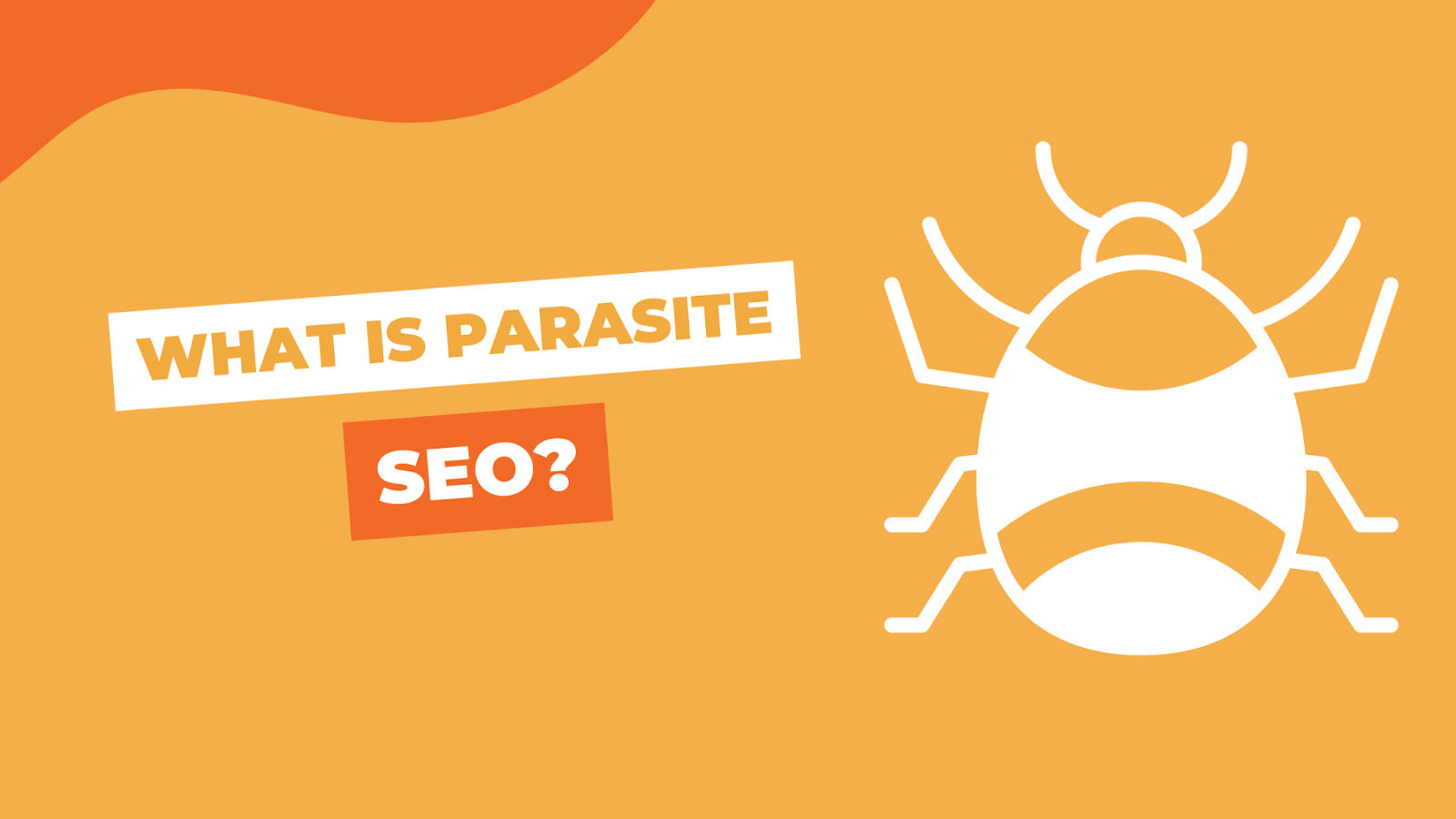
Parasite SEO is a strategy that involves publishing well-crafted content on a reputable, high-authority website to gain visibility in search engine rankings. By leveraging the existing traffic and credibility of these established platforms, you increase your chances of attracting leads and driving successful conversions. Sites with a high Domain Rating (DR), such as si.com or dallasnews.com, are trusted by Google and carry significant weight in search algorithms.
With parasite SEO, you can tap into the authority of these external sites to get your article noticed in search results. This technique not only boosts the visibility of your content but also helps you generate quality backlinks, which can be instrumental in promoting affiliate programs or other business objectives. By riding on the success of these high-authority websites, you effectively enhance your own online presence without needing to build authority from scratch.
How Parasite SEO Works
Parasite SEO is a strategic approach that involves leveraging the authority and credibility of well-established websites to enhance your content’s visibility in search engine rankings. By publishing your content on platforms with high domain authority-such as leading blogs, prominent forums, or popular social media pages-you can capitalize on their established trust and ranking power to boost your content’s performance.
For instance, imagine contributing a guest article to a renowned industry blog that already ranks highly on Google. By associating your content with their authoritative domain, you stand a much better chance of achieving higher search rankings than if the same content were posted on a lower-authority website. Think of it as riding in the slipstream of a top-performing vehicle in a race-you leverage their momentum to move forward faster and with greater efficiency.
Despite its advantages, relying on Parasite SEO also carries notable risks. Your success heavily depends on the stability and policies of the host platform. If the site you’re using changes its SEO practices, restructures its content, or experiences a drop in its own rankings, your content may be adversely affected. Additionally, ethical concerns can arise. Over-reliance on other platforms for visibility may be perceived as bypassing the hard work of organically building your own website’s authority.
That said, Parasite SEO can be a highly effective tool when used wisely and ethically. It offers a way to achieve quicker visibility in search results while you simultaneously work on strengthening your site’s own domain authority. As part of a well-rounded SEO strategy, it serves as a short-term booster while laying the groundwork for long-term success. However, balancing this approach with other tactics is crucial to ensure sustainable growth and minimize reliance on external platforms.
Does Parasite SEO Work?
The success of Parasite SEO is influenced by several variables, and while it can produce short-term gains, there are significant factors to consider:
Risk of Penalties: Misusing Parasite SEO can lead to violations of platform and search engine policies. This might result in harsh consequences such as ranking penalties, reduced visibility, or even reputational harm to your brand. Adhering to guidelines and implementing the strategy responsibly is essential to minimize these risks.
Dependence on External Authority: Parasite SEO relies on the authority and stability of third-party websites. If these platforms experience policy shifts, algorithm updates, or reputation issues, your content’s performance can be negatively impacted. This dependency highlights the importance of staying updated on the dynamics of the host platform.
Temporary Impact: The benefits of Parasite SEO may not be permanent. Hosting sites often revise their rules or algorithms, which can cause your content’s rankings to fluctuate or even disappear. Maintaining awareness of these potential changes is crucial for planning.
Content Quality is Key: High-quality content is critical for success in Parasite SEO.. Regardless of the platform’s authority, the content must be engaging, relevant, and valuable to the target audience. Poorly written or irrelevant content will likely fail to achieve meaningful results, even on high-traffic websites.
The Need for Diversification: Relying only on parasitic SEO is hazardous and unsustainable. Building your own authoritative online presence and employing a mix of SEO strategies, such as link building, keyword optimization, and content marketing, is essential for achieving lasting success.
Ethical Concerns and Long-term Reputation: The ethical aspect of Parasite SEO can be contentious. Since it leverages the credibility of external sites without directly building your brand’s own authority, it may be viewed negatively by some stakeholders. Over time, this could impact your business’s reputation if not handled thoughtfully.
Parasite SEO, when executed strategically and in accordance with platform policies, can yield significant advantages. However, to ensure a robust and enduring online presence, it is vital to address potential risks and integrate this approach into a broader, more sustainable SEO strategy. Balancing short-term benefits with long-term growth is the key to success in this competitive landscape.
Types of parasite SEO
Parasite SEO encompasses various approaches, with strategies tailored to the platform utilized. Below are some common methods, detailed to provide clarity on their application and potential impact:
Creating Blogs on Free Platforms
Leverage popular platforms like Medium, WordPress.com, or Blogger to create standalone blogs. Publish high-quality, SEO-optimized articles that offer value to readers, ensuring they are aligned with trending topics or industry-specific keywords. These platforms can serve as extensions of your main site, helping to attract additional traffic.
Engaging in Online Forums and Communities
Engage actively in specialist forums and online communities that appeal to your target demographic. Engage constructively in discussions by answering questions, offering insights, and subtly sharing links when relevant. Building trust in these communities is critical to making your links impactful.
Harnessing Social Media Networks
Use platforms like Facebook, Twitter, LinkedIn, and Instagram to share captivating posts that drive interest. By incorporating strategic links to your website or content, you can boost traffic while fostering engagement through likes, shares, and comments.
Answering Questions on Q&A Platforms
Contribute thoughtful and well-researched answers on Q&A sites such as Quora or Reddit. Add links sparingly and only when they genuinely enhance the answer. Building credibility on these platforms can establish your authority and indirectly benefit your main website.
Posting Reviews and Testimonials
Leave reviews or share testimonials on relevant third-party sites. These reviews can subtly include links to your website, increasing your visibility and potentially directing traffic from a highly targeted audience.
Contributing to Wikis and Online Encyclopedias
Submit content or edits to wikis like Wikipedia or specialized online encyclopedias in your niche. Ensure your contributions adhere to platform guidelines and maintain a neutral, informative tone. Links embedded in these entries should add genuine value to the topic.
Sharing Multimedia Content
Use platforms such as YouTube, Vimeo, or even SlideShare to upload videos, presentations, or other media. Optimize your titles, descriptions, and tags with relevant keywords and include clickable links in the description or video itself to drive traffic.
While these tactics can yield quick wins, they also come with inherent risks. Overusing or abusing Parasite SEO techniques may lead to penalties, either from search engines or the platforms themselves. To avoid such outcomes, focus on producing authentic, high-quality content that aligns with the audience’s needs and complies with platform policies. By doing so, you not only benefit from immediate results but also establish a reputation that supports sustainable growth.
When Should You Use Parasite SEO?
Parasite SEO, like any strategy, isn’t suitable for everyone. Before adopting it, there are some fundamental concepts you need to understand and accept.
First, recognize that parasite SEO focuses on generating short-term cash flow rather than building long-term assets. Content created under this strategy is hosted on third-party platforms, making it less appealing to potential website buyers, as you don’t own the content and could lose access to it at any time.
One significant risk is that the authority site hosting your content may choose to remove your post without warning. Additionally, competition is fierce-other marketers may publish similar or superior content on the same platform, potentially pushing your post down in search rankings.
Parasite SEO can also be unpredictable. While it has been a staple in the SEO world for years and will likely remain so in the near future, it’s highly sensitive to changes. With competitive keywords, rankings achieved through parasite SEO tend to fluctuate rapidly. Posts may achieve high visibility initially but can drop just as quickly.
Take, for instance, an example post on appetite suppressants:
Appetite Suppressant Post

www.si.com/showcase/nutrition/best-appetite-suppressants
This post initially ranked well and likely delivered a good return on investment. However, its rankings experienced a significant decline, illustrating the volatility of parasite SEO.
Traffic Drop Example:
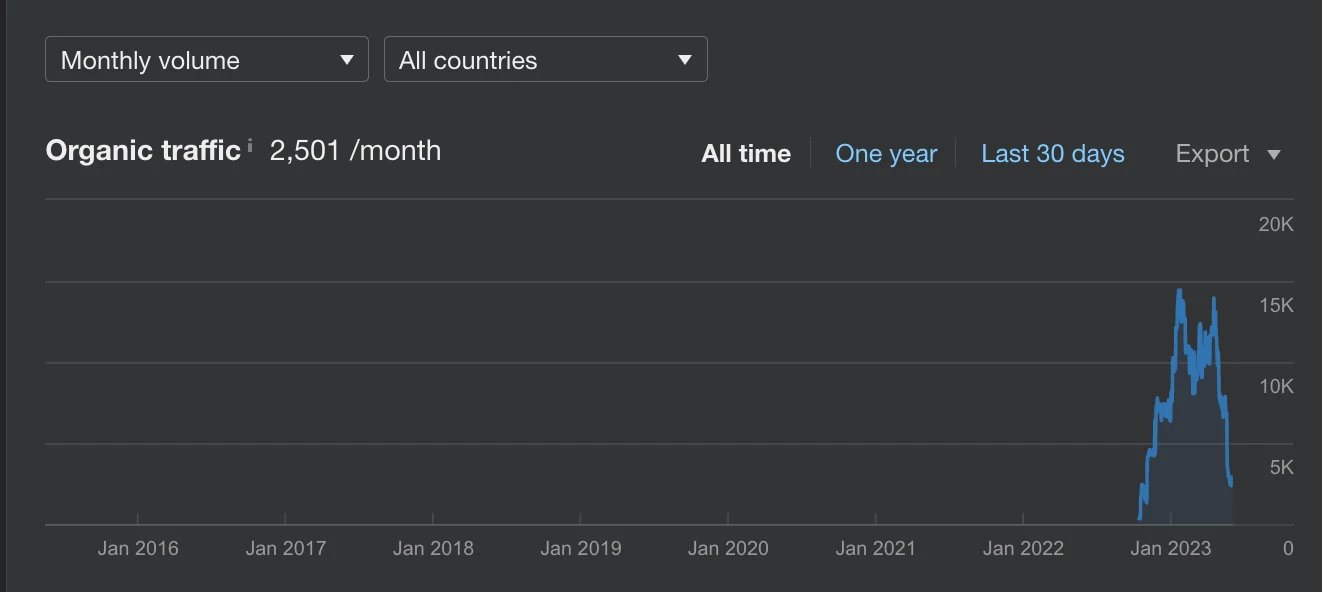
When working on a high-DR site that you don’t own, many factors are outside your control. For example:
You may not be allowed to edit or update your content once it’s live.
The site’s architecture could be restructured, affecting your post’s visibility.
Google’s perception of the site’s authority could shift due to algorithm updates or other factors.
The lack of control over these elements underscores the inherent risks of parasite SEO. Since the content resides on an external website, you’re at the mercy of changes imposed by the platform or search engines, and the list of potential challenges is extensive.
While parasite SEO can yield quick results and be an effective tool, these factors make it essential to carefully weigh its risks and limitations before integrating it into your overall strategy.
How Do You Implement Parasite SEO?
By now, you’re likely wondering how to implement Parasite SEO effectively. While it’s not overly complex, it does require a strategic approach and familiarity with SEO practices. Here’s a thorough breakdown of the procedure:
Identify High-Authority Platforms Open to Parasite SEO
The first step is to locate websites with high domain authority that allow you to publish content. Begin by researching your target topic and analyzing the top-ranking pages for relevant keywords.
Focus on platforms known for accepting guest contributions or sponsored content. Websites like si.com (Domain Rating 87) are excellent examples of authoritative platforms you can leverage. Familiarize yourself with their submission requirements and pitch your ideas to those that rank well for your desired keywords.
Leverage Sponsored Content or Paid Guest Posts
While some platforms offer guest post opportunities for free, many require payment for sponsored content, especially when dealing with high-authority websites. This is a common practice in Parasite SEO and offers the advantage of allowing you to include crucial calls-to-action (CTAs) or affiliate links in your article.
For instance, si.com permits sponsored posts, which marketers frequently use to boost their rankings. However, because you’re investing money in this content, it’s essential to ensure the CTAs and links are optimized to drive affiliate sales or conversions. Most unpaid guest posts won’t allow promotional links, making paid options more practical for achieving specific goals.
High-authority sites typically label such content as “sponsored,” so transparency is key in your approach.
Optimize Your Content with On-Page SEO Best Practices
Simply publishing on an authoritative site won’t guarantee success. You still need to optimize your content to compete for rankings. Use tools like SurferSEO, Ahrefs, or SEMrush to structure your article, include primary and secondary keywords, and maintain proper keyword density.
Ensure your content is engaging, well-organized, and aligned with the search intent of your target audience. Without proper on-page SEO, even the authority of the host site may not be enough to secure top rankings.
Build Backlinks to Your Parasite SEO Content
Even though your post will appear on a high-authority domain, you’ll often be competing against other well-established pages for competitive keywords. To outrank them, you’ll need to generate quality backlinks for your content.
Analyze your competitors to identify the number and quality of backlinks they have, then aim to build similar or better links to your post. For example, some successful parasite posts have upwards of 40 unique referring domains, giving them an edge in the rankings.
Backlink building can involve outreach, creating additional content on other platforms, or leveraging existing relationships to generate links to your post.
Final Note: Implementing Parasite SEO is a multi-step process requiring careful planning and execution. From finding the right platforms to optimizing your content and building backlinks, each step plays a critical role in ensuring success. While these efforts can yield substantial results, they require time, resources, and a commitment to maintaining best practices in SEO.
White Hat Parasite SEO
White-hat parasite SEO operates in much the same way as traditional parasite SEO but with a significant emphasis on ethical and sustainable link-building practices. The key distinction lies in how backlinks are created and managed to support your ‘parasite’ content. Instead of relying on questionable tactics such as spammy links or manipulative link wheels, white-hat methods focus on building high-quality, legitimate backlinks.
This approach involves securing links from reputable sources through genuine outreach efforts, such as contributing guest posts to respected websites or collaborating with influencers and industry experts. These backlinks, pointing to your parasite content, enhance its credibility and help it rank more effectively in search engine results.
The process mirrors the strategy used for building backlinks to a long-term authority site. The goal isn’t just immediate traffic or temporary gains but establishing a strong, durable online presence. By prioritizing quality over quantity, you’re setting up your content to remain relevant and authoritative over time.
For example, consider a scenario where a marketer secures several guest post backlinks from high domain-rating (DR) websites with steady traffic. These links contribute significantly to boosting the parasite post’s visibility and ranking, showcasing the power of ethical link-building.
By taking this white-hat approach, you’re not only adhering to search engine guidelines but also safeguarding your efforts from potential penalties. This method ensures that your parasite content supports your broader SEO strategy with integrity and long-term value.
Black Hat Parasite SEO
White-hat parasite SEO operates in much the same way as traditional parasite SEO but with a significant emphasis on ethical and sustainable link-building practices. The key distinction lies in how backlinks are created and managed to support your ‘parasite’ content. Instead of relying on questionable tactics such as spammy links or manipulative link wheels, white-hat methods focus on building high-quality, legitimate backlinks.
This approach involves securing links from reputable sources through genuine outreach efforts, such as contributing guest posts to respected websites or collaborating with influencers and industry experts. These backlinks, pointing to your parasite content, enhance its credibility and help it rank more effectively in search engine results.
The process mirrors the strategy used for building backlinks to a long-term authority site. The goal isn’t just immediate traffic or temporary gains but establishing a strong, durable online presence. By prioritizing quality over quantity, you’re setting up your content to remain relevant and authoritative over time.
For example, consider a scenario where a marketer secures several guest post backlinks from high domain-rating (DR) websites with steady traffic. These links contribute significantly to boosting the parasite post’s visibility and ranking, showcasing the power of ethical link-building.
By taking this white-hat approach, you’re not only adhering to search engine guidelines but also safeguarding your efforts from potential penalties. This method ensures that your parasite content supports your broader SEO strategy with integrity and long-term value.
Examples of Parasite SEO
There are several scenarios in which Parasite SEO can be applied, each with unique characteristics and outcomes. Here’s a deeper look at what you may usually expect:
Websites That Rank Quickly: Some posts can achieve high rankings in a short amount of time, especially when targeting competitive keywords on authoritative platforms.
Content Maintained Over Long Periods: Parasite SEO content that receives consistent updates and maintenance often mirrors the performance of legitimate websites. These posts tend to sustain their rankings over extended periods.
SEO Approaches Vary: Both white-hat and black-hat SEO techniques are employed, though the choice significantly impacts the post’s sustainability and compliance with search engine guidelines.
Let’s examine a few real-world examples to illustrate these scenarios.
Example 1: Competitive SERP Ranking Sustained for Over a Year
One notable example involves a sponsored post targeting the keyword “tax relief services.” The article, published on a high-authority domain (timesunion.com), competes in the highly competitive finance niche:

Example Post:
Best Tax Relief Services
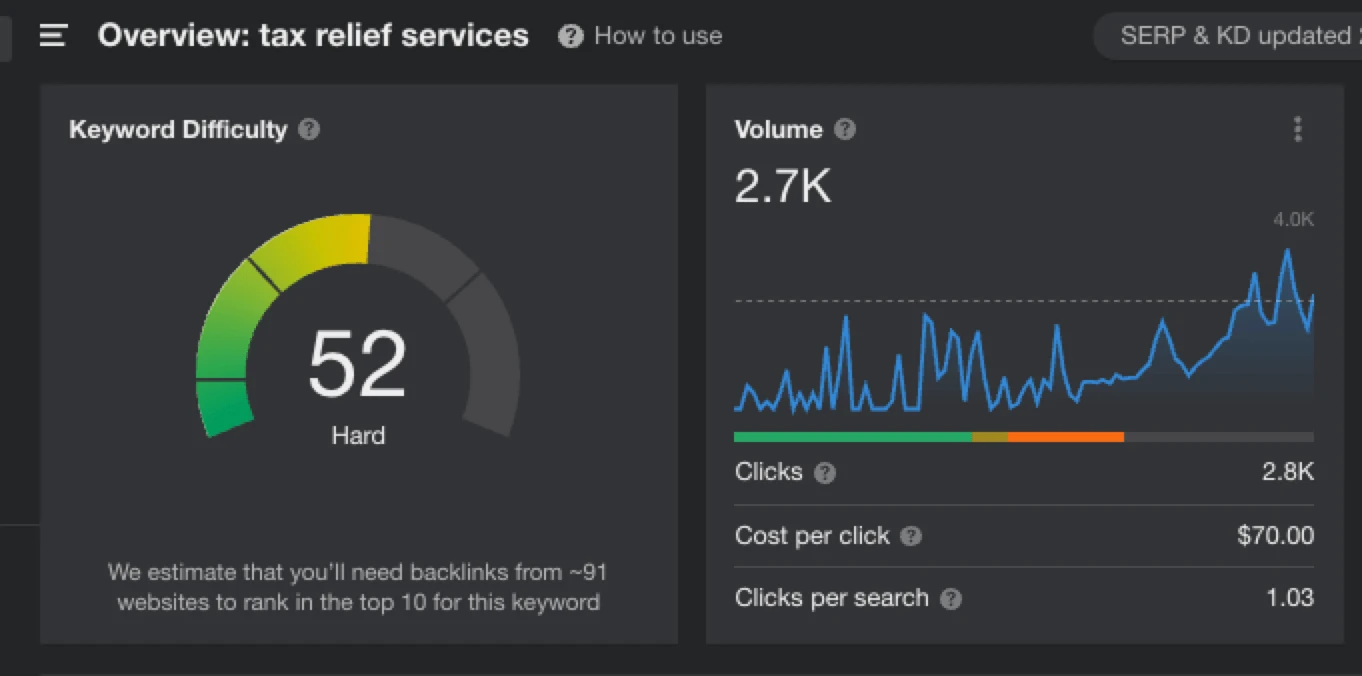
At the time of analysis, this post ranked #1 and even secured the coveted featured snippet for the keyword:
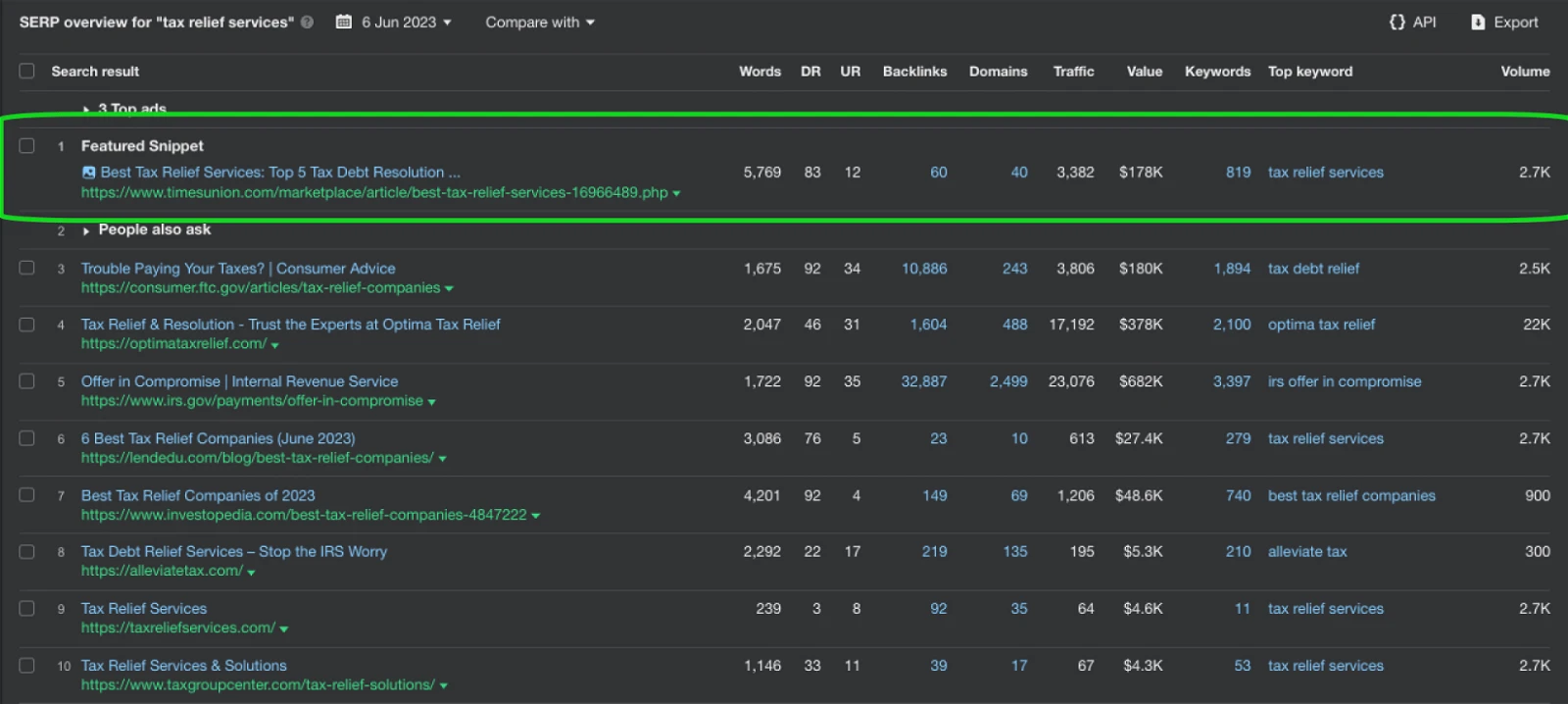
Keyword Difficulty (KD): High
Search Volume: Significant
What makes this example stand out is its longevity. The post has been actively maintained and updated since its initial publication in 2022, as verified using the Wayback Machine:
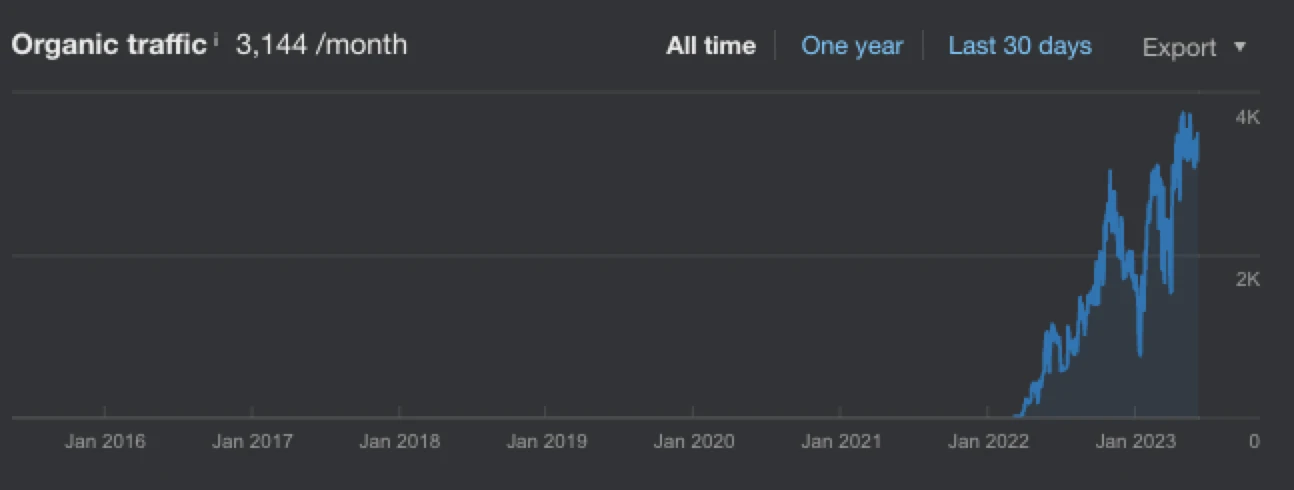
Snapshot from 2022: Content optimized for relevance.

Snapshot from 2023: Updated data and additional details.
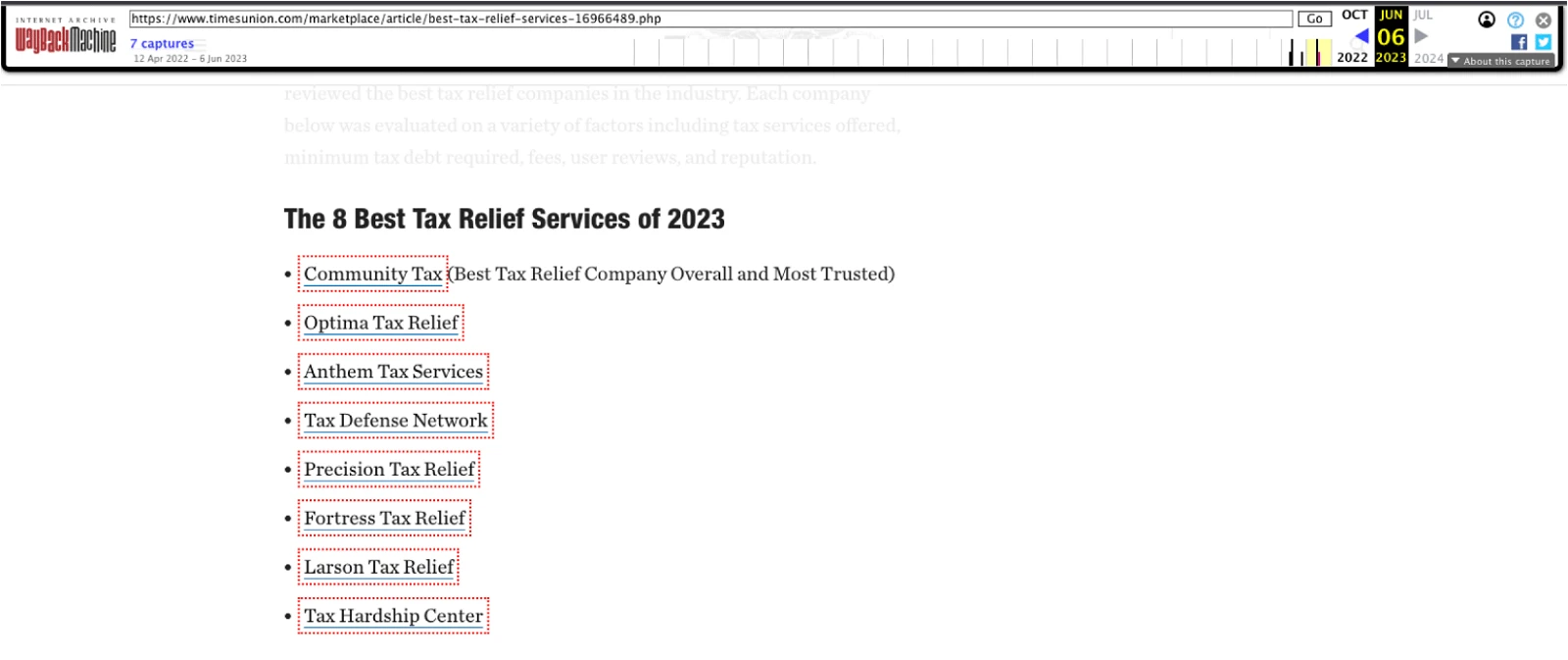
This consistent maintenance has likely played a key role in sustaining its top rankings and steady traffic growth.
Example 2: Content Achieving Rapid Rankings
Another example involves a recent sponsored post on dallasnews.com, targeting the keyword “weight loss pills” with a KD of 82 and a monthly search volume of 107k.
Example Post:
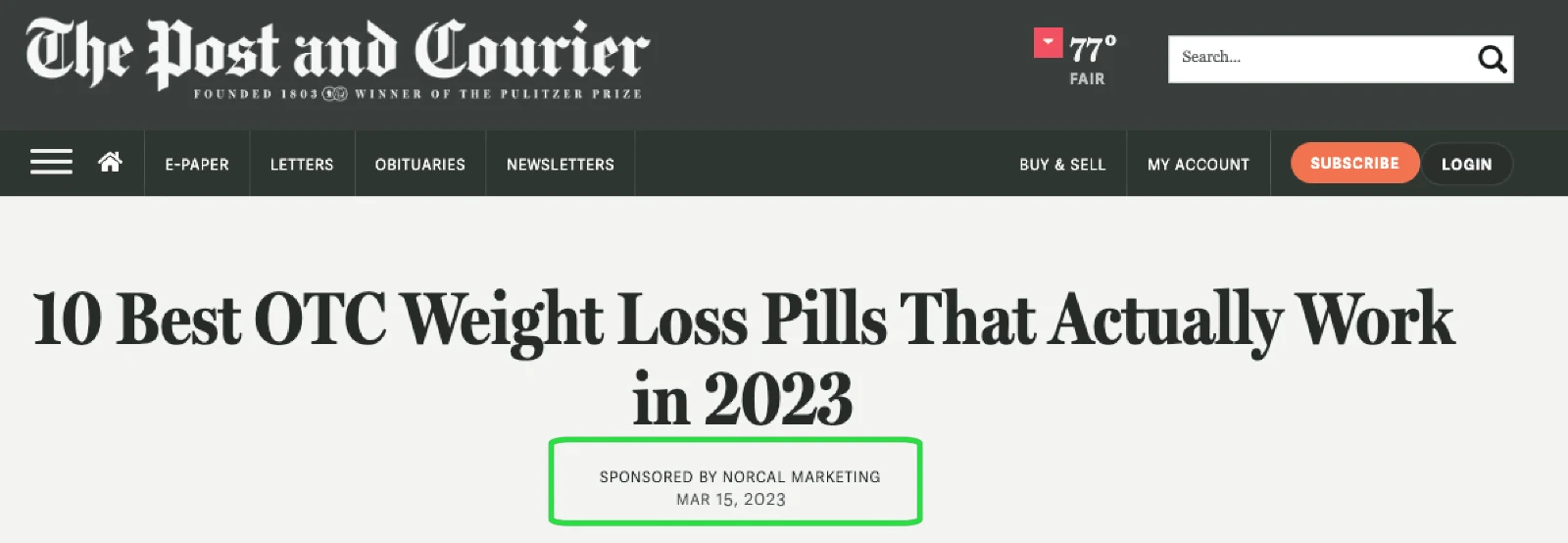
Despite the fierce competition in the health and wellness niche, this article rapidly climbed the rankings to secure the #4 position shortly after publication.
Key factors contributing to this success include:
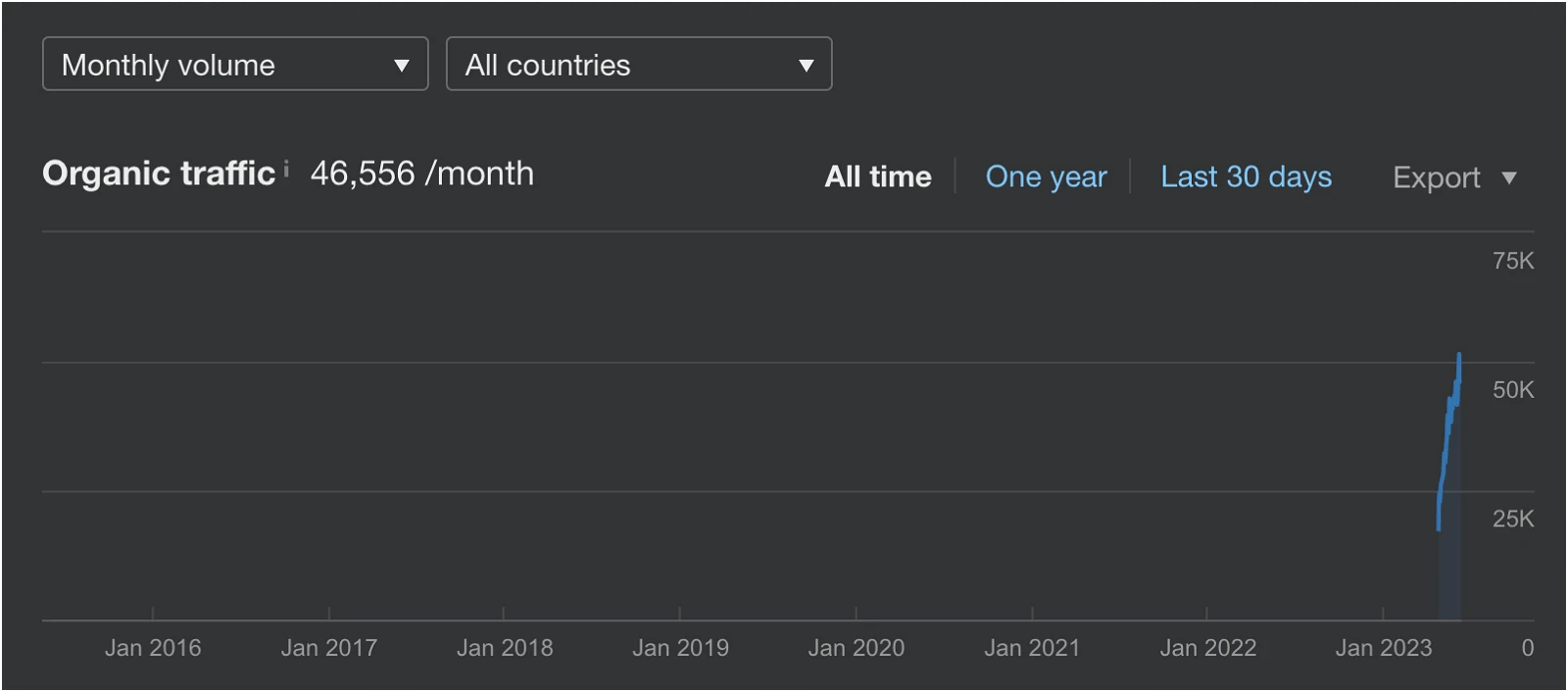
Strategic optimization of the content for the targeted keyword.
The growth curve for this post was impressive, with a steep trajectory indicating its effective leverage of the platform’s domain strength. Archive records also show that the article was published only a short time ago, yet it already competes against other parasite SEO posts, outperforming many to claim a top spot.
Insights and Takeaways
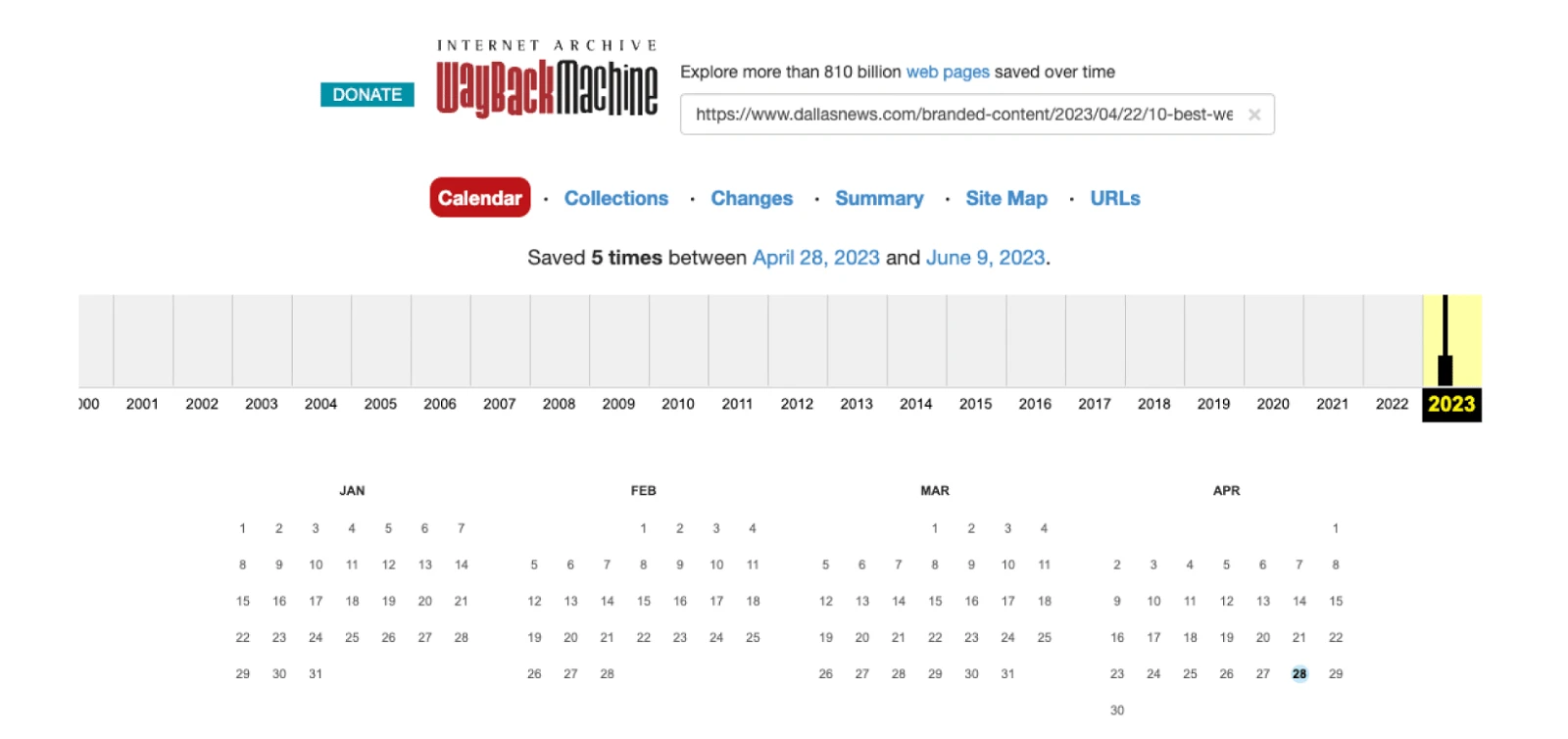
These examples highlight the potential of Parasite SEO when executed properly. Whether aiming for rapid results or sustained success, the authority of the host site, keyword targeting, and ongoing maintenance play critical roles. By leveraging these factors strategically, you can achieve significant visibility and traffic gains, even in competitive niches.
Competitive SERP Example Ranking for 1+ years:

Parasite SEO – Frequently Asked Questions
How To Avoid Keyword Competition On The Same Website?
In competitive industries, it’s common for multiple advertisers to target the same keywords on a single high-authority platform. Over time, these articles may compete against one another, with rankings fluctuating as new content gets published.
Example Scenario: On certain platforms, different articles targeting the same keyword rotate in visibility every few months.
Solution: To avoid such conflicts, consider negotiating an exclusive agreement with the website’s owner or webmaster. This ensures your article is the sole content targeting that specific keyword on their platform.
Example: In the past, we successfully negotiated exclusive rights for a specific keyword, ensuring that no competing articles were allowed to target the same keyword on the platform.
How Much Maintenance is Needed For Parasite SEO?
The amount of maintenance required depends on your chosen strategy.
- Short-Term Strategies (Burn and Churn): With this approach, minimal maintenance is needed. The focus is on regularly publishing new articles to replace older ones in the rankings. Updates are generally unnecessary.
- Long-Term Strategies: For sustained visibility, you’ll need to update your content periodically to maintain relevance and adapt to changing search algorithms. Regular updates keep the content optimized and competitive.
Example:
The previously mentioned article on “tax relief services” demonstrates consistent updates since 2022, showcasing a commitment to long-term maintenance.
How Much Does Parasite SEO Cost?
The cost of Parasite SEO can vary widely based on your chosen platform, keyword competitiveness, and required resources. Below is a general breakdown:
| Item | Cost Range | Notes |
| Publication Cost | $600–$2,000+ | Higher authority domains typically charge more for sponsored posts |
| Backlinks | $50–$450 each | Depending on whether you use a supplier or do your own outreach. |
| Writer | $100–$500+ | Rates vary based on article length and expertise required. |
Pro Tip:
To estimate backlink needs, analyze similar posts ranking in your target SERP. For instance, if competing articles have 20–40 referring domains, aim for a similar range.
How Can You Ensure That High-Authority Sites Don’t Kill Your CTAs?
Securing the inclusion of your affiliate links and calls to action (CTAs) in a published article is critical for maximizing ROI.
Tips for Success:
- Check Existing Content: Review similar sponsored posts on the platform. If CTAs and affiliate links are included, you’re likely able to include them as well. Use these examples during negotiations.
- Clarify Requirements: Clearly communicate your expectations when discussing terms with the publication. Provide examples of existing content to demonstrate your desired format.
- Review Guidelines: Study the platform’s publishing guidelines to ensure that marketing materials or affiliate links are permitted.
- Example Scenario: By referencing existing sponsored posts with preserved CTAs, you can negotiate a deal that aligns with your goals and ensures your affiliate links remain intact.
Parasite SEO involves balancing competition, cost, and maintenance while ensuring your efforts align with the hosting platform’s policies. Addressing these questions effectively will help you execute a successful and sustainable strategy.
Wrapping Up
At Octopuswriters, we understand the intricacies of parasite SEO and can help you craft compelling, optimized content that works seamlessly on high-authority platforms. Whether you’re aiming for short-term results or building a long-term strategy, our expertise ensures your content doesn’t just ride the wave but makes a lasting impact. Reach out to Octopuswriters today, and let us help you navigate the complexities of parasite SEO for measurable success.

